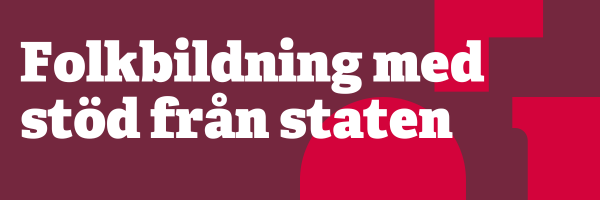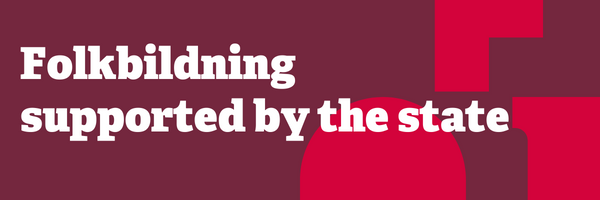1.2 - Folkbildning med stöd från staten

Folkbildning är ett gemensamt namn för studieförbund och
folkhögskolor som möjliggör kunskap och utbildning för alla på ett demokratiskt
sätt. Folkbildning är fritt och frivilligt, där du som deltagare får bestämma
vilket ämne, cirkel eller aktivitet du vill delta i. Innehållet utgår alltid
från dig och dina egna behov och erfarenheter. Dessutom har du stort
inflytande över ditt eget lärande.
Hur fungerar folkbildning?
Folkbildning ska utformas efter varje studieförbunds egen
profil. Den ska vara mångsidig och flexibel så att den snabbt kan tillgodose
nya behov. Den ska dessutom vara riksomfattande. I Sverige finns det åtta studieförbund som varje år anordnar
studiecirklar och olika arrangemang. Varje studieförbund har en egen profil men
alla följer samma riktlinjer och regelverk. Folkbildningen i Sverige får varje
år bidrag från staten men även bidrag från många kommuner och
regioner. Dessa bidrag får användas av studieförbund och folkhögskolor under
stor frihet. De som kontrollerar att dessa bidrag används på rätt sätt är Folkbildningsrådet.
Varför statligt stöd?
I regeringens proposition 2013/14:172 "Allas kunskap – allas bildning" finns ett särskilt mål för folkbildningspolitiken formulerat. "Folkbildningen ska ge alla möjlighet att tillsammans med andra öka sin kunskap och bildning för personlig utveckling och delaktighet i samhället." Ett viktigt skäl till det statliga stödet är att folkbildningen bidrar till en demokratisk utveckling av samhället.Det är riksdagen som beslutar om de fyra syften som staten har för folkbildningen:
- Stödja verksamhet som bidrar till att stärka och utveckla demokratin.
- Bidra till att göra det möjligt för en ökad mångfald människor att påverka sin livssituation och skapa engagemang att delta i samhällsutvecklingen.
- Bidra till att utjämna utbildningsklyftor och höja bildnings- och utbildningsnivån i samhället.
- Bidra till att bredda intresset för och öka delaktigheten i kulturlivet.
Folkbildningsrådets uppgift är att fördela och följa upp statsbidragen till folkhögskolor och studieförbund.
Folkbildningsrådet drivs som en ideell förening med myndighetsuppdrag givna av riksdag och regering.
För att säkerställa att studieförbunden arbetar med aktuella samhällsfrågor och bidrar till de fyra syften ska studieförbunden beskriva hur de tänker jobba utifrån:
- omvärldsanalys
- folkbildningens kvaliteter
- studieförbundets egen profil.
Omvärldsanalys
Studieförbunden är viktiga samhällsaktörer som bidrar till att lösa aktuella utmaningar i samhället. Folkbildningsrådet ansvarar för att ta fram en omvärldsanalys. När studieförbunden beskriver vad de ska arbeta med ska de koppla omvärldsanalysen till sin egen profil.
Verksamhetens kvaliteter
Folkbildningens fem kvaliteter är:- bildning
- demokrati och delaktighet
- utbildning
- civilsamhälle
- kulturliv.

Folkbildning, which is sometimes translated as liberal or popular adult education, is a collective term for the country’s study associations and folk high schools, which enable access to knowledge and education for everyone based on democratic principles. Folkbildning is free and voluntary, where participants are able to decide which subject, circle or activity they want to participate in. The content is always based on the individual and the individual’s own needs and experiences. In addition, participants have a great deal of influence over their own learning.
How does folkbildning work?
Folkbildning is designed according to each study association's unique profile. It needs to be versatile and flexible so that it can respond quickly to new needs. It also must be made available nationwide. In Sweden, there are eight study associations that organise study circles and various events each year. Each study association has its own profile, but they all follow the same guidelines and regulations. Every year, folkbildning in Sweden receives grants from the state, but it is also supported through grants from a number of municipalities and regions. Study associations and folk high schools have a great deal of freedom in deciding how they would like to use these grants. The Swedish National Council of Adult Education is responsible for ensuring that these grants are used for their intended purpose.
Why state funding?
Government Bill 2013/14:172, “Allas kunskap – allas bildning” ("Everyone's knowledge – everyone's education") lays out a specific goal for folkbildning policy. "Folkbildning should give all people the opportunity to increase their knowledge and education together with others for their personal development and participation in society". One important reason that state funds are used is that folkbildning helps promote the development of democratic principles in society.
The Parliament is responsible for making decisions in relation to the four purposes the state has identified for folkbildning:
- Support activities that contribute to the strengthening and development of democracy.
- Enable a broader spectrum of the population to take control of their own lives and increase engagement and the willingness to participate in societal development.
- Contribute to closing educational gaps and raising the level of education and training in society.
- Help create increased interest and participation in cultural activities.
The Swedish National Council of Adult Education's is tasked with distributing and following up on national public grants provided to the study associations and folk high schools.
The Swedish National Council of Adult Education is a non-profit association with certain authoritative tasks delegated by the government and the Riksdag.
In order to ensure that the study associations are working on relevant social issues and contributing to the achievement of the four purposes described above, the study associations must describe how they intend to operate based on:
- External analysis
- The qualities of popular education
- The study association's profile.
External analysis
Study associations are important actors that help address many of the challenges we currently face in society. The Swedish National Council of Adult Education is responsible for performing an environmental analysis. When describing their intended focus areas, study associations must link the environmental analysis to their unique profile.
Qualities
The five qualities of folkbildning are:
- Education
- Democracy and participation
- Bildning (knowledge and cultivation)
- Civil society
- Culture.